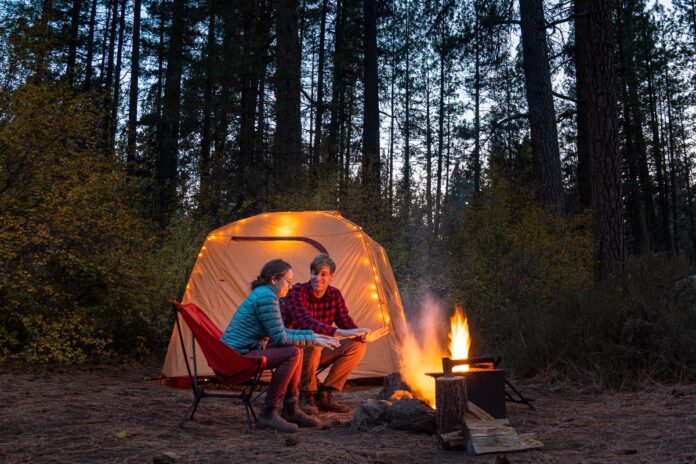
Camping is a thrilling adventure that brings us closer to nature, offering a reprieve from the hustle and bustle of daily life. But to truly enjoy the great outdoors, it’s crucial to be well-prepared.
One of the key elements of a successful camping trip is having the right gear. Creating a comprehensive checklist ensures you won’t forget any essentials, allowing you to focus on the experience rather than worrying about what you’ve left behind.
Essential Clothing Items for A Camping Trip
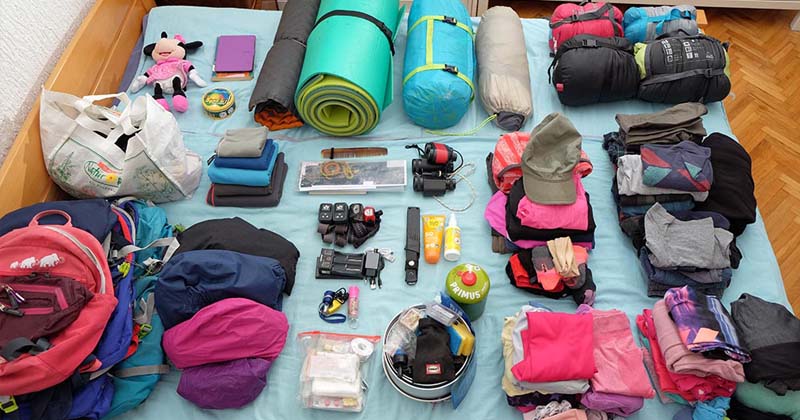
When it comes to outdoor gear for a camping trip, versatility is key. Choose moisture-wicking, breathable fabrics that can adapt to varying weather conditions. A good rule of thumb is to pack layers, including a moisture-wicking base layer, insulating mid-layer, and waterproof outer layer.
Don’t forget extra socks, underwear, and a warm hat. Proper footwear is essential; sturdy hiking boots or trail shoes provide support and protection.
Shelter and Sleeping Gear Essentials
Shelter and sleeping gear essentials are paramount for a comfortable camping experience. Your choice of shelter, such as a durable tent, hammock, or bivy sack, serves as your protective cocoon against the elements. Ensure your tent has a rainfly and a footprint to shield you from rain and moisture.
Pair your shelter with the right sleeping gear—a warm, season-appropriate sleeping bag and a comfortable sleeping pad or air mattress. These items not only offer insulation but also elevate your sleeping comfort.
Outdoor gear like this can be the difference between a restful night under the stars and a challenging, sleepless one. When properly chosen and maintained, your shelter and sleeping gear become your trusted companions, allowing you to recharge and wake up refreshed, ready to embrace the adventures of the day ahead.
Cooking and Food Preparation Equipment
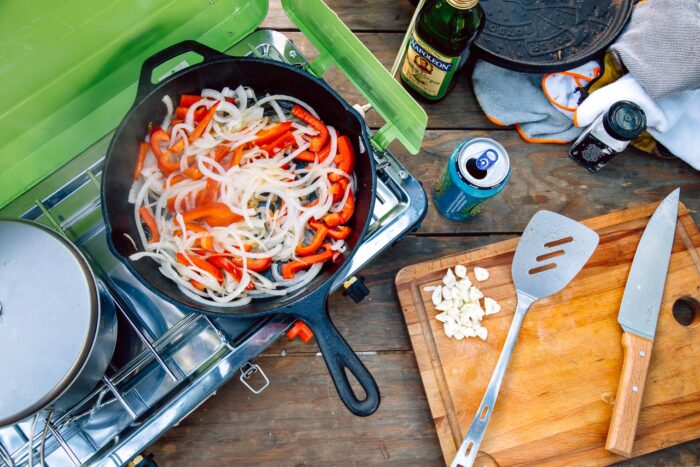
Savoring delicious meals in the wilderness enhances the camping experience. A portable camp stove with fuel, cookware, utensils, and a lightweight cooler for perishables are essential. To minimize waste, use reusable dishes and cutlery. Don’t forget to bring a reliable fire starter or matches for campfire cooking.
Hydration and Water Purification Necessities
Staying hydrated is non-negotiable in the outdoors. Pack a water filter or purifier to ensure a safe supply of water from natural sources. Additionally, bring a hydration bladder or reusable water bottles to carry water with you on hikes and around the campsite.
Navigation and Safety Tools for Camping
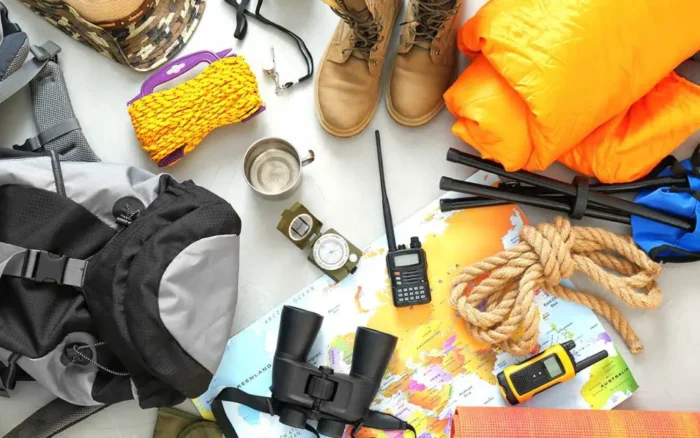
Navigation is paramount in the wilderness. A map and compass or a GPS device can help you stay on the right track. Ensure you have a first-aid kit stocked with essential supplies and the knowledge to use it. A multi-tool or Swiss Army knife is handy for various tasks, including gear repairs.
Campfire and Lighting Equipment to Consider
A campfire adds ambiance and warmth to your campsite. Carry firewood, a firestarter, and a safe way to extinguish the fire.
For illumination, headlamps and lanterns are indispensable for moving around at night, cooking, and playing cards in the tent.
Personal Hygiene Items for A Comfortable Stay
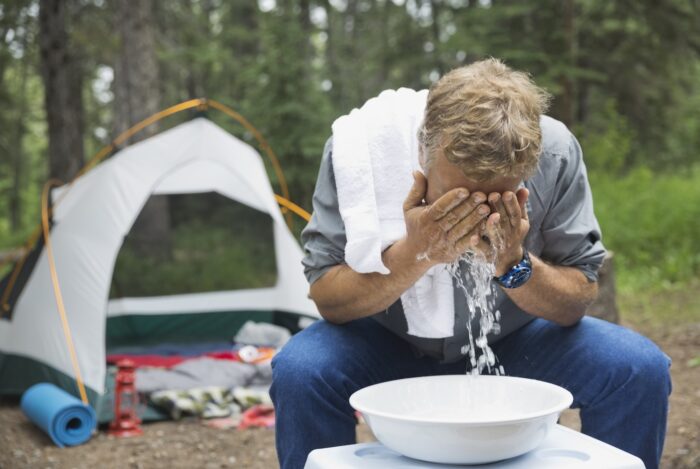
Maintaining personal hygiene is essential for comfort during your camping trip. Bring biodegradable soap, a washcloth, toothbrush, and toothpaste. A compact towel and toilet paper are essential for staying fresh. Consider a portable camp shower for a refreshing rinse.
Multi-Purpose and Repair Tools for Emergencies
Unexpected situations can arise in the wilderness, making multi-purpose tools invaluable. A quality multi-tool, duct tape, and repair kits for your gear can save the day. Additionally, a whistle, signal mirror, and emergency shelter like a space blanket are vital for safety.
Leave-No-Trace Principles and Eco-Friendly Gear
Responsible camping involves leaving minimal impact on the environment. Follow Leave-No-Trace principles by disposing of waste properly, respecting wildlife, and minimizing noise. Choose eco-friendly camping gear made from sustainable materials to reduce your carbon footprint.
Items to Skip and Leave Behind when Camping
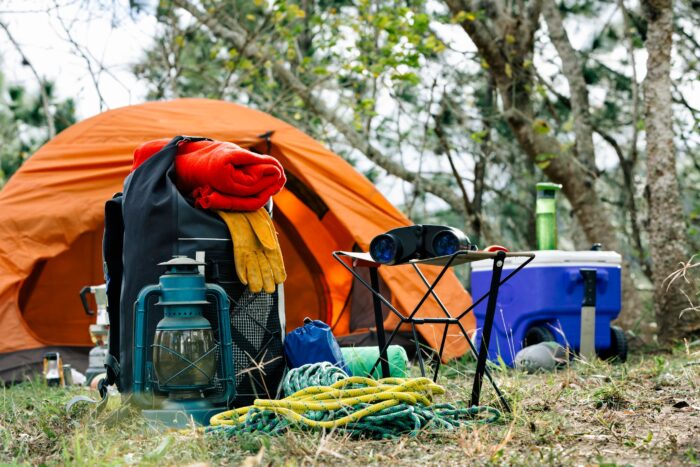
While it’s tempting to pack everything you can think of, overpacking can lead to a heavy and cumbersome load. Leave behind unnecessary electronics, excessive clothing, and non-essential luxuries. Focus on the essentials to keep your pack manageable and your camping experience enjoyable.
Camping Activities and Entertainment
In addition to the essentials mentioned earlier, consider the activities and entertainment options you might want to bring along to enhance your camping experience. Depending on your interests and the location of your camping trip, you might want to bring:
- Fishing Gear: If your camping spot is near a lake or river, fishing can be a relaxing and rewarding activity. Don’t forget your fishing rod, tackle box, and any necessary licenses.
- Binoculars and Wildlife Guides: For nature enthusiasts, a pair of binoculars and field guides can make birdwatching and wildlife spotting more enjoyable.
- Books and Board Games: In the evenings or during rainy days, books, magazines, or board games can keep everyone entertained. Opt for compact and lightweight options.
- Musical Instruments: If you or your camping companions play musical instruments like a guitar or harmonica, consider bringing them along for campfire jam sessions.
- Camera and Photography Equipment: Capture the beauty of the outdoors with your camera. Make sure you have spare batteries, memory cards, and a protective case.
- Art Supplies: If you’re artistically inclined, bring sketchbooks and drawing materials to capture the natural surroundings.
- Hiking and Sports Equipment: If your camping trip includes hiking or sports like frisbee or badminton, pack the necessary gear.
Conclusion
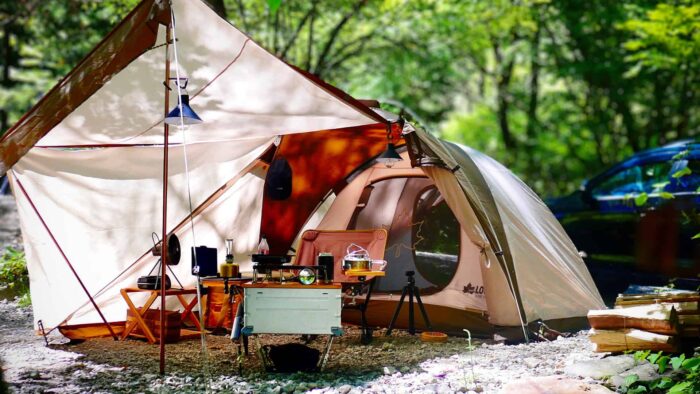
In conclusion, crafting the ultimate camping gear checklist is essential for a successful outdoor adventure. By carefully considering your clothing, shelter, cooking equipment, hydration, navigation tools, campfire gear, personal hygiene items, and emergency tools, you’ll be well-prepared to tackle any challenges that come your way while enjoying the beauty of nature.
Remember to prioritize eco-friendly gear and leave-no-trace principles to preserve the wilderness for future generations. Finally, resist the temptation to overpack; only bring what’s necessary to ensure a comfortable and enjoyable camping experience.
With the right checklist in hand, you’re ready to embark on unforgettable camping journeys that will connect you with the great outdoors.








